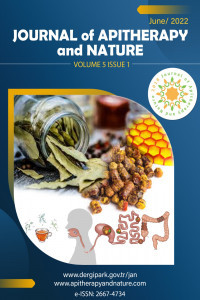Portuguese Propolis: A Potenial Source of Environmentally Friendly Fungicides
Portuguese Propolis: A Potenial Source of Environmentally Friendly Fungicides
Portuguese Propolis, Propolis,
___
- 1. FAO (2017) Available at http://www.fao.org/faostat/en/#home (accessed July 2018).
- 2. Ali EOM, Shakil NA, Rana VS, Sarkar DJ, Majumder S, Kaushik P, Singh BB, Kumar J (2017) Industrial Crops Products 108: 379-387.
- 3. Fokt H, Pereira A, Ferreira AM, Cunha A, Aguiar C (2010) Current Research, Technology and Education Topics in Applied Microbiology and Microbial Biotechnology 1: 481-493.
- Yayın Aralığı: Yılda 2 Sayı
- Başlangıç: 2018
- Yayıncı: Oktay YILDIZ
Chemical Profile of Greek Arbutus unedo Honey – Biological Properties
αrgyrο ANDREOU, Ioanna CHINOU, Konstantia GRAIKOU
Intestinal Morphology Broiler Chickens Supplemented with Propolis
Maja MISKULIN, İvana KLARIC, Matija DOMACINOVIC, Berislav PRAKATUR, Mirela PAVIC, Nika PAVLOVIC, İvan MISKULIN
Yoga Bee, a New Approach for Health
Determination of Propolis Origin Using Phenolic Composition and Artificial Neural Networks
İsabel REVILLA, Ana María VIVAR-QUINTANA, Pedro HERNÁNDEZ-RAMOS
Muhammad IQBAL, Tai-ping FAN, David WATSON, Sameah ALENEZI, Muhamad SAHLAN
Insights and Pitfalls in Propolis Research
Vassya BANKOVA, Milena POPOVA, Boryana TRUSHEVA
The Effect of Propolis on Selected Blood Parameters of Broilers
İvan MISKULIN, İvana KLARIC, Matija DOMACINOVIC, Berislav PRAKATUR, Zvonimir STEINER, Vatroslav SERIC, Maja MISKULIN
Chemical Composition of Selected Propolis Samples from Kyrgyzstan and Kazakhstan
Argyro PETROPOULOU, Konstantia GRAIKOU, Jaroslaw WIDELSKI, Krystyna SKALICKA-WOŹNIAK, Zuriyadda SAKIPOVA, İoanna CHINOU
Effect of Brazilian Propolis-containing Ointment on Genital Itching in Menopausal Women
Hiroshi MIURA, Yasuko MIURA, Yuki SHIMODA, Satoko KAGABU, Hiromitsu TSUBAKI, Yukihiro TERADA
